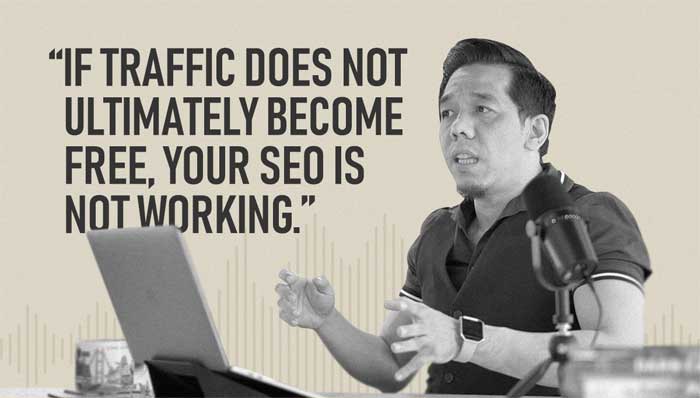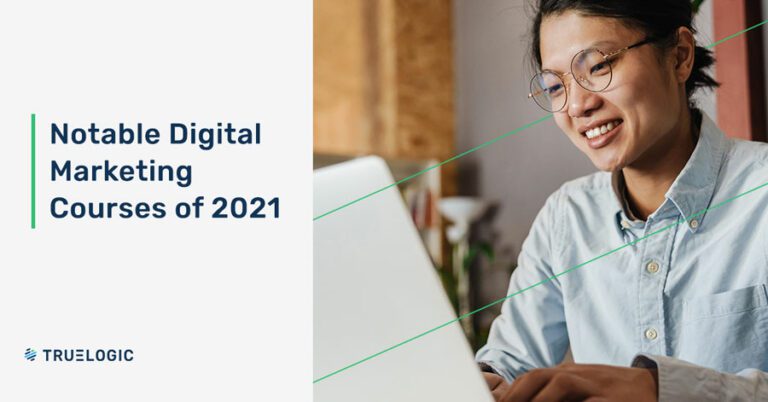Truelogic Episode 35 Recap Part 1: In-house vs. Agency Marketing: Which is Best for You?

If you want to scale up your marketing, you will need talented people who can take charge of and execute your strategy.
But should you build your in-house marketing team or hire an agency partner?
Shell’s Head of Global Content Strategy Jason Cruz joins us in today’s episode to find out which decision is better for you.
Podcast Transcription
Berns San Juan: Hi guys and welcome to another episode of Truelogic DX. Today, we’re going to be talking about a topic that I am personally, genuinely curious about. We’re going to talk about brand marketing approaches to digital and agency approaches to digital. Now, if you’re new to digital marketing or if you’re starting a career and you’re probably clueless about where to start, this might be the right conversation for you to listen to.
Well, lucky for you. We’ve got the former business development director and communications strategist from our friends at ADA. And he’s now the Head of Global Content Strategy at Shell, one of the largest energy companies in the world. He’s got a very broad speaking circuit. He lectures especially when it’s for a good cause. So, I don’t wanna waste much time. Join me in a conversation with Mr. Jason Cruz. So Jason, Head of Global Content Strategy versus the last role you had in ADA, what are the most glaring differences between the two roles?
Responsibility Difference between In-house vs Agency Marketing
Jason Cruz: The responsibilities are very different. So, when I was in ADA, I was heading biz dev and com strat, biz dev is about looking for clients and it was bringing in external clients to the agency and that’s how the agency makes money. The com strat is creating the direction for the brands, advertising comms, and data campaigns. That’s very product specific, right? It’s very solutions-oriented. Now that I am on the client side and I’m working on content strategy, it’s very direction-based and very long-term thinking.
I would say if we were going to pick one glaring difference, it’s the time scale. So for example, when I joined the company last November, my first job was to create this three-year content strategy. I mean, who does three-year content strategies now especially for agencies, right? I mean, we both were on the same side of the boat, and we know that it’s very short term, right? Its clients give you a brief, solve this and then I want to see results in three to six months. Yeah. 12 months is already like amazing long for a performance eval. But here we are, I had to create a three-year content strategy, and I have to say it’s one of the toughest things I had to do early this year. That was my entire Q1 because I can’t predict. I don’t have a crystal ball. I can’t predict what content would resonate with the audience.
But that also pushed my research abilities to the max because I had to work with a lot of our internal data team and even our external research teams to figure out what are the long or long-ish terms, characteristics, traits, and maybe even building blocks of a particular target market.
So my target audience for my particular line of work is Gen Zs and very specifically Gen Zs who are into science and engineering. I don’t talk to the regular customer base or consumer base. That’s not my job. My job is to talk to engineering students, get them super inspired and motivated to join our competition, and kind of talk about it. And perhaps, when they enter the workforce 15, or 20 years from now, start developing cars of the future or visions of mobility and energy of the future.
It’s very long-term. As a concept, it’s very hard to grasp. But once you’re in the thick of things, it makes a lot of sense. It’s about investing now for a future benefit, but my stakeholders are kids and I must figure out what kind of stories would work or resonate with these kids, both good and bad. Good because it’s fun. It’s very interesting. It’s very exciting. It allows me to be super relevant with the younger generation.
Berns San Juan: And take, for example, the role at ADA, right? Coming from an agency background before ADA, there was probably already that somebody who held that job title before, or at least you can tell from the job, you sort of have an idea about what it is so you know what to expect. Like in this Shell role, did you inherit it from somebody or is it an entirely new role?
Jason Cruz: For both, honestly, it’s a bit of a jump into the dark for me, except I would say the ADA one, hard as it may seem to believe, it was harder because when I was in my first agency for almost eight years, my job was really about social media and that’s where we met. I would give talks, you give talks on SEO, give talks on social media and content, and influencer marketing.
And so moving to ADA, it was a lot of biz dev and I didn’t think I would be okay at the job. But I suppose the fact that I’ve built a network as well over the last 10 years, helped a lot with my teaching, and my public speaking. So, the business development was like a natural transition to going out there. And I don’t have a sense of shame going to clients or messaging people on LinkedIn. I’m not at all embarrassed to do that.
And you know, I like to think about it this way. The worst that could happen is they say no and then you’re back to the status quo and you’ve lost nothing, right? I would say the hardest transition. It was shifting my focus from writing just social media strategies or just content strategies into literally getting out there, putting our company out there and I would say, trying to attract clients into quite an obscure product that ADA had which is data.
Now moving to the energy sectors and you know with Shell, content strategy was almost like me going back to my roots, which is social media content, digital content, stuff that it’s very hands-on. Still, I don’t get to, I mean, I’m not writing the copy or creating the visuals anymore but getting behind in the fundamentals of what kind of stories people like.
I thought that was an easier transition. Honestly, that was an easier transition for me from a work perspective. But from a cultural perspective, that was tough because you know how it is. Agency culture is drastically different, right? We’re a little too hustle mindset. We don’t necessarily respect time and boundaries and vacations. And I moved this company.
And I’m sure everyone in this session can relate to that if you’re coming from an agency. But joining a brand, a multinational and it’s always been like a top employer as well. It was such a weird experience too… when I applied for leave and I didn’t set ‘away’ from office alert, my manager was like, “You gotta do it.” Otherwise, people would message you and say, “You know, it’s fine. I can read it and reply the next day.” She said, “No, you shouldn’t even be reading your text.” So it was, yeah, it was a massive culture shake-up for me, I would say.
Berns San Juan: So those are two big changes for you. The target audience is very different because at ADA audience is whoever the target audience of the client is.
Jason Cruz: Correct. And for the company, my target audience or businesses, so I kind of had two, right? The target companies and then when I work with the companies, whatever their target audience is, I need to be here.
Culture: Biggest Difference Between Agency Life vs Brand Life
Berns San Juan: And then I think the other big difference is in culture. Are those the two biggest contrasts between agency life versus brand life?
Jason Cruz: I would say with done contrast, culture. Culture is crazy. It was massively jarring to my system. The fact that when my workday ends, which is around 4:00 or 5:00 PM London time. When my workday ends, literally nobody calls me. Nobody messages me. No one, no one reads my WhatsApp messages to my team. And I kind of felt at one point that I was the toxic word culture guy.
I’ll tell you a story. When was this? I think this was around July or August. You know, when you have a thought and you don’t wanna forget it, you have to send it. And I sent an email. It was a couple of members of my team were copied and then my agency partners were copied and I sent it on a Saturday morning, Manila time, Saturday. That’s like the middle of the night Friday, right? And I wouldn’t say I didn’t get a follow or a stern talking to but I got a stronger reminder from my teammates, “Hey man, it’s late Friday night. We shouldn’t be calling our agencies at this time. We shouldn’t be sending them emails ‘cuz that makes them work.”
And I’m thinking, “Holy cow, where were these brands in the agency?” “Where were these people?” Admittedly, it’s just such an accepted culture. For agency people to.. if you got an email on Saturday, you’d read it, which means you don’t necessarily have to reply. And I would like to say my clients never did expect me to reply unless it has the word urgent, “Jason, reply now.”
But it was just that culture that we have to check work. We must read this now. We must open our inboxes on weekends. It was that for me for almost 11 years, and then suddenly I’m in this culture where, “No, you can’t do that. You shouldn’t do that because there are boundaries, and you have to respect them.” I like it. I do like the shift.
Berns San Juan: Candid question though, would winning that role have been possible without the agency experience?
Jason Cruz: Ooh, that’s tough. I can only speak from my perspective and I would say no because the way, even my interview session went and the way they were looking at my profile, it was the depth and breadth of work that I had in the industry. And I don’t think that’s possible if you’re not an agency.
So I’ll give an example. I have friends who have been client-side all their lives and they work for big multinationals. They probably have one or two major campaigns throughout their entire careers, right? Over 10 years, maybe one or two major ones. And then every year you have your annual, you know this right, the annual advertising campaign or annual Christmas campaign for the Philippines. And that gives you depth and breadth of maybe one a year, maybe two if you’re very lucky as a brand or if you have a budget.
But if you’re an agency, like my time in ADA, I brought in 12 clients, if I’m not mistaken, or 12 projects. And in one year and 10 months, that’s already 12, right? And that’s not counting all the projects that we collaborated on with region or pitches that we lost or that weren’t awarded so there’s a lot of those. So, I would say the agency background. And I would always tell this in school talks, if you want a lot in a very short period, like a lot of learnings, a lot of lessons, a lot of failures, even in a very short period, go agency because the agency is very rock and roll.
Whereas I would say now that I’ve been client side for a year, it’s a lot more based because you’re thinking more long term. You’re not necessarily thinking of 10 projects at once. In agencies though, the workstream is very different, right? You need clients, you even breathe clients. So, if you have 10 clients, then your agency makes money, but that means 10 projects in one year, which is good for career development, but bad for sleep hours. But at the end of the day, it’s what helped. I would say it’s what helped boost my experience in a relatively short amount of time.
Berns San Juan: Because I don’t think you could gain that experience in 10, 11, 12 years of not being in an agency. I also think the other thing I like about being in an agency is, and I’m not sure if you’re going to share the same sentiment. It’s very forgiving, right? Because a lot of the work you do is very progressive, more than a perfectionist. I think in brand, there is probably more perfectionism than there would be in an agency because in agencies, I mean, let’s face it, you are allowed to fail. There is almost explicit permission to fail and then you can reiterate and then you can do a better design existing brand.
Jason Cruz: Just to build on the whole agency where you’re almost allowed to fail. I would say, there is a degree of leeway because I would say clients probably know or don’t know that the work is only as good as the brief, right? If the brief is not well written, then the work’s gonna reflect it. And there’s also the factor that agency work is dictated by people. So, if you work with a great team inside the agency, then the work is also really good and clients tend to be more forgiving in that sense, because they know that, look, if it wasn’t like an amazing campaign, it’s probably a one-off. The next one’s probably gonna be better. And generally, that pays off.
From a client perspective, I would say that it’s less risk-taking as natural because it’s now your money, right? You’re not playing with the client’s money anymore, it’s taking off your budget so you’re a bit warier, you’re a bit more cautious when it comes to taking all of those risks. For me, when I brief my agencies for campaigns, I know some are not gonna be amazing, of course, there’s that internal pressure for me to ensure that all the campaigns are amazing ‘cause of the responsibility that comes with the role. But the reality is, it can. I mean, if every campaign was amazing and every single campaign is like a can winner or a pencil winner, and no, they’re not, right? So you try to increase your chances. Yes. But there’s no way to guarantee that everything’s gonna be amazing.
And agencies, at the end of the day, if you have multiple clients, honestly, and I’ve gone through this before. If you fail, but you have four or five clients that are also supporting the business, it’s probably not going to be horrible. If you feel a bad reputation-wise, you might take a hit, but the business stream is relatively safe.
Jason Cruz: Where I see agencies fail is if they place their bets on like one or two really big clients and then they lose that client and then bang! That’s where you see people getting retrenched and I think that’s very sad.
Creative Pursuits: Agency or Brand?
Berns San Juan: That’s easy to see if you’re part of the leadership team of an agency ‘cause you know, those safety units are there, you know how well diversified the portfolio of the agency is. But when employees don’t necessarily know that, right? Between the two, which ones have allowed you to pursue your passion projects? Which ones have allowed you to be more creative? Is it an agency or brand?
Jason Cruz: I would have to say both are perfectly open to it. I think there are two different motivations from the companies I’ve worked on. When I was in an agency, the agencies that I worked in, were quite public and is almost the face of the company in advance of the industry, allowing us to expand our network, build a reputation, and allow us to get new clients. There, I say that. They allow us to be out there.
Berns San Juan: I agree. I would say most of our clients come from people that we’re part of a lecture, we’re part of an event. Or you speak somewhere, right? So it does build confidence in the brand.
Jason Cruz: Yeah, it does. And I’m proud of some of the client relationships that I’ve had over the years as well because many of them are my students and the amount of business that they brought in the two agencies that I worked for is significant. And it’s allowed me also to build a personal reputation as well that if I work on your brand, we’re gonna give it our best shot and that’s the least that they deserve. Also, because a lot of ‘em are my students, so the expectations are high, and my teacher integrity wants me to give them the best possible work.
From the brand perspective, it’s a bit more interesting because the way our company works is, it’s never gonna stop you from pursuing the things that make you happy. So during my interview process, I wanted to be very transparent with them that I teach, and these are the number of hours that I teach in a year. Here are the Saturdays allocated for my classes. Here are the memberships in the industry that I’m part of and just disclose that. And I think that’s a very important part of the relationship between myself and my company. And the whole disclosure part.
The whole public speaking thing, I would have to say there are some limitations because now, with the role, I do have a more significant responsibility, I have some representation, so I have to be careful that I don’t misrepresent who I am, especially what I do for the brand. I’ve said no to a lot of talk invites, which I usually don’t.
But there’s a two-prong reason for that. The first is that if it’s a talk, for example, and it’s got a competitor in it, then I can’t do it. I won’t do it. It’s just not good for our brand reputation. And if there’s a risk that it would be misconstrued as representing what the brand stands for, then I’m not gonna do it.
The second is that I’ve also gotten a little older and a little bit more I say established in the industry. So, I would protect my time a bit more. I’m a lot more selective now with my engagements. I don’t necessarily do as many public speaking engagements anymore. But if it’s a school, it’s a pro bono thing for a public university, and that’s an automatic yes for me, usually. But yeah, generally, if it’s just to protect the business’s reputation and my time, then I limit myself. Now, I actively limit myself.
Berns San Juan: On the topic of competency, how large is the digital team you work with now?
Jason Cruz: Oh, it’s huge, man. I mean, the company is almost 90,000 strong. There are probably digital departments that I haven’t even met or heard of so it’s just massive. From our team, we’re not necessarily all handling digital work. I would say probably, a dozen would be involved in the digital work but that’s spread out across a lot of different roles.
Digital Savviness Between an Agency and a Brand
Berns San Juan: So how would you distinguish the difference in terms of digital savviness in an agency and a brand?
Jason Cruz: That’s a good question. In agency, digital savviness is… I mean, both of us were neck-deep in this. Digital savviness is about a breath. I would say it’s a lot of the wide knowledge of the digital world because client questions can happen anytime and it can be about anything, right? So knowing a lot about digital platforms, channels, content, case studies, best-in-class examples, publications, and even reading, was the challenge when I was in the digital agency servicing clients.
But from a brand, I would say it’s more depth where you must be good at or specialize in one or two. I would say like two minimum platforms or channels, and digital or concept or a principle and digital. Why? Because you have your agencies who can provide the whole breadth part, but the depth part you have to have. Otherwise, if you’re not, let’s use SEO as an example ‘cause that’s the nature of your business. If your client was deep into SEO and knew what this person was talking about, they’re not gonna run their SEO right themselves, but they’re gonna need a partner to do it like you guys. But then the brief, the quality of the brief will be amazing because they’re, they’re neck deep. For you as the agency, I would say, the more you know though, the more value adds you can put into the solution.
So if there’s a difference, I think those are the two big ones and those are the two competency angles that I would look at. I wanna be an expert, so when I brief you, I know what I’m talking about. But I expect my agency to be the explorer. Like, “Tell me what’s new out there. Tell me what’s something that’s outside of my radar and then we can work on that together.”
Berns San Juan: Simply because you live and breathe this, the expectation is that you are sort of like a pathfinder to everything that’s probably happening now. And whatever is happening, foreseen, I think agencies already have an opinion, like as soon as the iOS 14.5 came out and described the iPhone came out. And we were probably, “Okay. How many campaigns am I gonna have to redo?”
Jason Cruz: Here’s the thing I noticed, especially with the Philippine agency setting. I think a lot of agencies are just too comfortable with their cash cows and usually that social media management or making PVCs or print ads. I think they’re too comfortable that there’s no longer a lot of that desire to, “Okay. What’s new out there? What should we tell our clients when they ask these questions?” Because personally, this is a very small target sample, right? When I teach and have agency people in my classroom, they always bring up to me that their clients ask them questions and they’re not sure what to say.
For me, the agency’s job is to always be curious about what’s out there. Always assume that a client’s gonna ask you a question about something they don’t know about. And if you are the agency that gives them the answer, not even just the solution. If you’re the person that can give them resources or get into a conversation where you both discover answers together, then the value add is so much better.
Berns San Juan: Like social media, people will raise social media issues about, “Hey guys, I’m seeing this. I need opinions. Is it a big deal?” And then that becomes a point of discussion. But I also think that goes to the culture of the agency, right? Again, it’s more than just about cashing in on your cash cow, it’s do you love the craft that you’re doing?
Unique Capabilities in Brands
Berns San Juan: What about unique capabilities? Are there capabilities you’ve discovered in the brand, are there things that you saw in the brand now that you’re part of the multinational corporation, are there capabilities, are there competencies there that you experienced that go, “Oh wow! No, we don’t do this in an agency.” Like, “Oh wow! I’ve never seen this. I’ve only seen this in this setting.” Have you experienced anything like that in a brand that you’ve never seen while you were in an agency?
Jason Cruz: Well, my sample size is one ‘cause I’ve only ever been in one non-agency company. I would say it’s a lot more business objective or business implication skewed. So for example, an agency, most agencies don’t think about how will this campaign make their client money. I mean, they could probably create a campaign and then how this is achieved the objective. So, if the brief is let’s make a website. Most agencies will build a website that does X, Y, and Z. That’s it. But they don’t… or maybe they do, but I know for sure with agencies I’m exposed to, they don’t necessarily think about how this website will contribute to my client’s bottom line in the next five years. I mean, ideally, they should, but the reality is it’s out of scope, right? It’s out of scope.
But from a brand, it’s always how this will impact if not my financial bottom line, or my reputational bottom line. Because companies, especially the companies that take business seriously, know that if their reputation is not good, it impacts the bottom line. So I dislike it when companies go, “Any publicity is good publicity.” No, it’s not. Bad publicity reduces shareholder value and there’s a ton of literature out there that proves this.
So now, as a brand, I must think about that all the time. When I write a brief to my agencies, I want them to know very clearly that this work impacts our business in an ABC way. Not just, “I want a website. I want a TikTok account. I want a new content plan for my Instagram.” I would say that’s very basic. It’s not wrong, but it’s short-term. And I’ve learned quite quickly over the last year that short-termism is great if you wanna show quick wins to your manager. But it’s not good for long-term results, which you should be gunning for if you’re aiming to do amazing in the role or you’re going for a more senior role. So just gotta think more long-term and have more business impact.
Berns San Juan: So that’s all we’ve got time for today’s Truelogic DX podcast, but there is more to this conversation so I hope you join me in part two of this conversation between brands versus agencies.
If there’s somebody you’d like to hear us talk to, let us know. We’d love to have them. Don’t forget to subscribe to our Spotify, Google, and Apple accounts and set up your alert for new episodes. We are powered by the Pod Machine. Thank you very much to our friends at Podmachine, and I will see you in the next episode. Cheers










